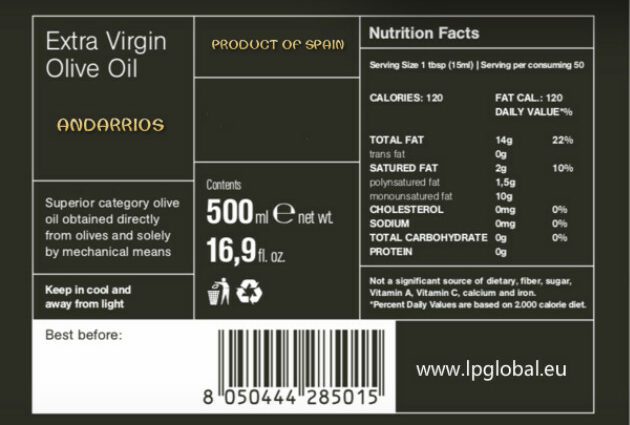ינהאַלט
ניט-ריפילאַבאַל ייל קאַנס און מאַנדאַטאָרי לייבלינג אויף בוימל קאַנטיינערז
On November 15th, the standard for the use of non-refillable oil cans and mandatory labeling on oil containers in the HORECA sector was approved.
The Royal Decree that prohibits filling oil cans in restaurants and other hospitality services, it will enter into force on January 1, 2014, just as it was going to be when it was thought that it would be established throughout the European Union. The Council of Ministers of Friday, November 15, 2013, approved the obligation of the use of non-refillable oil cans and mandatory labeling on oil containers in the hotel, restaurant and catering sector.
As we mentioned, the entry into force of the רויאַל דעקרעט It is dated for next January 1, 2014, but a period of use of the oils to fill up is given until February 28 of next year, so that the establishments use up the stocks. Does it make sense? Can’t they use it for cooking? Because that is something that remains in the air, the consumer will not know with what oil it is cooked, and if they present the seasoned salads to the diner?
Anyway, as of January 1, 2014 … I rectify, as of February 28, 2014, oil can or bottles that can be filled with olive or olive-pomace oils, of course, or with extra virgin olive oils of quality and with guarantees but that they are commercialized in bulk.
Now, let’s remember that there are some tricks that will allow you to continue using containers that allow filling, for example aromatizing oils. It is enough to incorporate a few sprigs of aromatic herbs or spices so that the rule of non-refillable oil cans does not affect the HORECA sector, as argued by the Association of Sustainable Restaurants.
The European Commission denied the inclusion of this rule that plays in favor of transparency, which aims to prevent fraud and give extra virgin olive oil the value it deserves, in addition to disclosing its qualities, although something else should be done to publicize all the characteristics and benefits of a good olive juice.
But Spain, one of the world leaders in the production of olive oil, has kept its promise by launching the new standard framed in the ‘Action Plan on the olive oil sector of the European Union’, which aims to improve the competitiveness of the sector.
Again voices will be heard in favor and against this measure, the loose ends of the regulations will come to light, we will see non-compliance in bars, restaurants, catering … what do you expect as consumers? What do you think as hoteliers?










